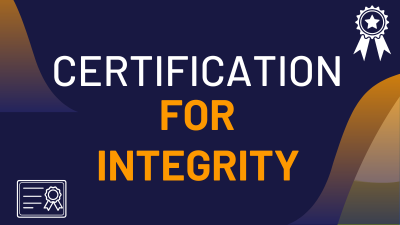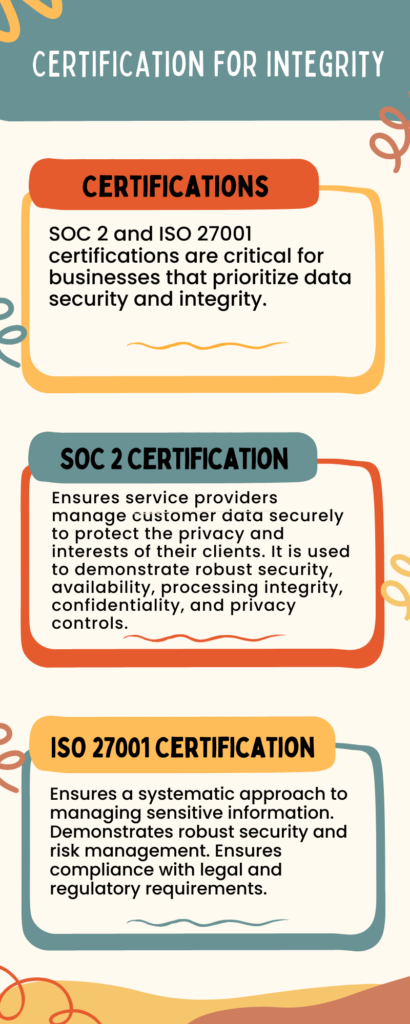
Ensuring Ethical Business Practices: Certification for Integrity
- May 9, 2024
- OHI

In today’s globalized and highly competitive business environment, maintaining ethical standards is more important than ever. Companies that prioritize integrity not only foster trust among consumers and partners but also pave the way for long-term success and sustainability. One effective way to demonstrate a commitment to ethical business practices is through certification for integrity. This blog explores the importance of ethical business practices, the role of integrity certifications, and how companies, especially those involved in accounting outsourcing services, can implement and benefit from these certifications.
Ethical business practices involve conducting business in a manner that is fair, transparent, and respectful to all stakeholders. This includes employees, customers, suppliers, and the broader community. Key elements of ethical business practices include:

Integrity certification is a formal recognition that a company adheres to high ethical standards in its operations. These certifications are granted by independent third-party organizations that evaluate a company’s practices against established ethical criteria. Commonly recognized certifications include:
SA8000 (Social Accountability):
This standard focuses on workplace conditions and ensures that companies maintain fair labor practices. It covers aspects such as worker safety, fair wages, and the prohibition of child labor, promoting ethical treatment of employees.
B Corp Certification:
This certification is granted to companies that adhere to stringent standards of social and environmental performance, accountability, and transparency. B Corps are legally obligated to evaluate the effects of their decisions on their employees, customers, suppliers, community, and the environment.
SOC 2 (System and Organization Controls 2):
SOC 2 is a certification developed by the American Institute of CPAs (AICPA) for service providers that handle customer data. It focuses on five trust service criteria: security, availability, processing integrity, confidentiality, and privacy. Achieving SOC 2 certification demonstrates that a company has implemented and follows stringent information security policies and procedures, ensuring the protection of customer data.
ISO 27001 (Information Security Management Systems):
ISO 27001 is an international standard for managing information security. It provides a systematic approach to managing sensitive company information, ensuring its security and integrity. This certification requires companies to establish, implement, maintain, and continually improve an information security management system (ISMS). By achieving ISO 27001 certification, companies demonstrate their commitment to protecting information assets, reducing the risk of data breaches, and maintaining the trust of their clients and partners.

1. Enhanced Data Security:
Both SOC 2 and ISO 27001 certifications emphasize the importance of robust data security measures. By adhering to these standards, companies can significantly reduce the risk of data breaches, ensuring that sensitive information is protected against unauthorized access and cyber threats.
2. Building Customer Trust:
Achieving SOC 2 and ISO 27001 certifications demonstrates a company’s commitment to data security and integrity. This can enhance customer confidence and trust, as clients are assured that their data is handled with the highest level of security and care.
3. Competitive Advantage:
In an increasingly digital world, data security is a top priority for many clients. Companies with SOC 2 and ISO 27001 certifications can differentiate themselves from competitors, attracting more business by showcasing their dedication to maintaining high security standards.
4. Compliance with Regulations:
SOC 2 and ISO 27001 certifications help companies comply with various regulatory requirements related to data security and privacy. This ensures that businesses are not only meeting industry standards but are also prepared for any legal scrutiny or audits.
5. Continuous Improvement:
Both certifications require regular audits and assessments, encouraging companies to continuously improve their security measures. This ongoing process helps organizations stay ahead of emerging threats and maintain a high level of security over time.
To achieve SOC 2 and ISO 27001 certifications, companies need to follow a structured approach:
1. Conduct a Gap Analysis:
Begin by assessing your current security practices against the SOC 2 and ISO 27001 standards. Identify areas where your company needs to improve to meet the certification requirements.
2. Develop and Implement Policies:
Create comprehensive security policies and procedures that align with the SOC 2 and ISO 27001 standards. This includes defining roles and responsibilities, establishing incident response plans, and implementing access controls.
3. Train Employees:
Ensure that all employees understand the importance of data security and are trained on the company’s security policies and procedures. Regular training sessions can help reinforce best practices and keep staff updated on new security threats.
4. Conduct Internal Audits:
Regularly review and assess your security measures to ensure compliance with SOC 2 and ISO 27001 standards. Internal audits help identify any gaps or weaknesses in your security practices and provide an opportunity to address them before the external certification audit.
5. Engage an External Auditor:
Hire a certified external auditor to conduct a thorough assessment of your security practices. The auditor will evaluate your compliance with SOC 2 and ISO 27001 standards and provide recommendations for improvement if necessary.
6. Maintain Continuous Improvement:
Achieving certification is not the end of the process. SOC 2 and ISO 27001 require ongoing monitoring and continuous improvement of security practices. Regularly review and update your policies, conduct periodic audits, and stay informed about emerging threats and best practices in data security.

To successfully implement and maintain ethical business practices, companies can follow these strategies:
In an era where consumers, employees, and investors are increasingly concerned with corporate integrity, ensuring ethical business practices is crucial. Certification for integrity provides a structured and credible way for companies to demonstrate their commitment to ethical standards. By obtaining and maintaining integrity certifications, businesses can build trust, enhance their reputation, and achieve long-term success.
Implementing ethical practices requires dedication, clear policies, effective communication, and ongoing evaluation. Despite the challenges, the benefits of maintaining high ethical standards far outweigh the costs. Companies that prioritize integrity not only contribute positively to society but also position themselves for sustainable growth and success in the competitive global market.
Contact us for a customized NO OBLIGATION proposal for outsourcing your accounting activities.









